 Chaste Value
Chaste Value Published online by Cambridge University Press: 22 December 2017
Ben Jonson's marriage masque Hymenaei (1606) features a competition between virginity, represented by Opinion, and married chastity, represented by Truth, in which marriage predictably triumphs. Jonson's seeming admiration for the virgin's autonomy complicates this generic trajectory, however. Although the ‘unprofitable virgin’ is maligned by Truth for her greedy hoarding, Opinion's depiction of virginity bears a close resemblance to Jonson's famed masculine ideal, what Thomas Greene calls the ‘centered self’. Like this masculine subject, Hymenaei's virgin possesses qualities associated with centeredness and circularity, both of which, in Jonson's corpus, ‘become symbols not only of harmony and completeness but of stability, repose, fixation, duration’. Virgins, Opinion extolls, ‘Have all things perfect, spin their own free fate, / Depend on no proud second, are their own / Center and circle, now and always one’ (718–20). The virgin thus serves as an analogue to Jonson's masculine ideal, in which the virtuous man is defined by his impenetrability. In Hymenaei, however, in which union signifies not only heterosexual marriage but also the yoking of Scotland to England and King James to his people, the virgin must submit to a higher power, compromising her autonomous integrity for ‘Eternal Unity’ (821), cemented ‘In th'one's obedience and the other's sway’ (730). Traditionally, the marriage contract, as Victoria Kahn demonstrates, functioned as a foundational analogy for the subject's relationship to the state. Here, the virgin's fate parallels that of the masculine subject in a monarchal society, sacrificing autonomy as she submits to potentially advantageous, though patriarchal, authority. This intermingling of erotic and political discourse, Melissa Sanchez points out, produces a subject who desires his own subjection and even abjection. Though ostensibly male, the subject is queered not only through this abjection but through repeated comparisons to the chaste – first virginal and then married – woman, figured in sexual relation to the male sovereign.
This chapter explores the permutations of this paradigm in London city comedy, where, I argue, chastity is invoked to explore the particular subjectivity of homo economicus. Throughout city comedy, female chastity functions as an analogue to masculine temperance and is invoked to explore men's subjugation to commercial forces. As Jean Howard demonstrates, prostitution plots often functioned as a means of negotiating the limits of traffic and its effect on the early modern subject.
To save this book to your Kindle, first ensure [email protected] is added to your Approved Personal Document E-mail List under your Personal Document Settings on the Manage Your Content and Devices page of your Amazon account. Then enter the ‘name’ part of your Kindle email address below. Find out more about saving to your Kindle.
Note you can select to save to either the @free.kindle.com or @kindle.com variations. ‘@free.kindle.com’ emails are free but can only be saved to your device when it is connected to wi-fi. ‘@kindle.com’ emails can be delivered even when you are not connected to wi-fi, but note that service fees apply.
Find out more about the Kindle Personal Document Service.
To save content items to your account, please confirm that you agree to abide by our usage policies. If this is the first time you use this feature, you will be asked to authorise Cambridge Core to connect with your account. Find out more about saving content to Dropbox.
To save content items to your account, please confirm that you agree to abide by our usage policies. If this is the first time you use this feature, you will be asked to authorise Cambridge Core to connect with your account. Find out more about saving content to Google Drive.